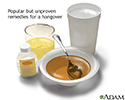Hangover treatment
A hangover is the unpleasant symptoms a person has after drinking too much alcohol.
Symptoms can include:
- Headache and dizziness
- Nausea
- Fatigue
- Sensitivity to light and sound
- Rapid heartbeat
- Depression, anxiety and irritability
Tips for preventing a hangover:
-
Drink slowly and on a full stomach. If you are a small person, the effects of
alcohol
are greater on you than on a larger person.
Alcohol
Alcohol use involves drinking beer, wine, or hard liquor.
Read Article Now Book Mark Article - Drink in moderation. Women should have no more than 1 drink per day and men no more than 2 drinks per day. One drink is defined as 12 ounces (360 milliliters) of beer, 5 ounces (150 milliliters) of wine, or 1 1/2 ounces (45 milliliters) of 80-proof liquor.
-
Drink a glass of water in between drinks containing alcohol. This will help you drink less alcohol, and decrease
dehydration
from drinking alcohol.
Dehydration
Dehydration occurs when your body does not have as much water and fluids as it should. Dehydration can be mild, moderate, or severe, based on how muc...
 ImageRead Article Now Book Mark Article
ImageRead Article Now Book Mark Article - Avoid alcohol completely to prevent hangovers.
If you have a hangover, consider the following for relief:
- Certain measures, such as fruit juice or honey, have been recommended to treat a hangover. But there is very little scientific evidence to show that such measures help. Recovery from a hangover is usually just a matter of time. Most hangovers are gone within 24 hours.
- Electrolyte solutions (such as sports drinks) and bouillon soup are good for replacing the salt and potassium you lose from drinking alcohol.
- Get plenty of rest. Even if you feel good the morning after heavy drinking, the lasting effects of alcohol reduce your ability to perform at your best.
- Avoid taking any medicines for your hangover that contain acetaminophen (such as Tylenol). Acetaminophen may cause liver damage when combined with alcohol.
References
Finnell JT. Alcohol-related disease. In: Marx JA, Hockberger RS, Walls RM, et al, eds. Rosen's Emergency Medicine: Concepts and Clinical Practice . 8th ed. Philadelphia, PA: Elsevier Mosby; 2014:chap 185.
O'Connor PG. Alcohol use disorders. In: Goldman L, Schafer AI, eds. Goldman's Cecil Medicine . 25th ed. Philadelphia, PA: Elsevier Saunders; 2016:chap 33.
-
Hangover remedies - illustration
Relief of a hangover can be obtained by: taking over-the-counter-pain-relievers; drinking plenty of water; eating soup and foods that contain fructose; resting.
Hangover remedies
illustration
Review Date: 4/30/2015
Reviewed By: Laura J. Martin, MD, MPH, ABIM Board Certified in Internal Medicine and Hospice and Palliative Medicine, Atlanta, GA. Also reviewed by David Zieve, MD, MHA, Isla Ogilvie, PhD, and the A.D.A.M. Editorial team.

